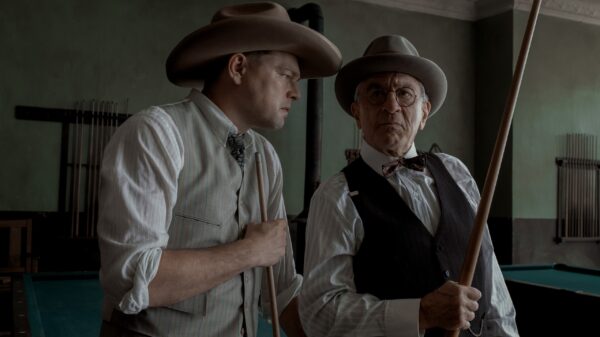Staff writer Katie Newman reviews Olivia Wilde’s divisive and much-discussed film “Don’t Worry Darling”, finding that its initial promise soon gives way to disappointment.
Warning: This article contains major spoilers for ‘Don’t Worry Darling’ throughout.
In Olivia Wilde’s directorial debut, the 2019 film “Booksmart”, she follows a pair of teen girls on a mission to turn around their poor social status and finally be seen as fun. Instead of sticking to well-known territory, Wilde has branched out into the psychological thriller genre with the ambitious but poorly executed “Don’t Worry Darling”.
The film was plagued by scandals before it even hit the big screen: rumours of a feud between Pugh and Wilde, an online debate on whether Harry Styles spat on Chris Pine, and rumours of Wilde cheating on her former husband, Jason Sudeikis, with Styles. While the scandals seem to have generated interest in this film, it does not live up to its hype, and the result is a lacklustre affair that leaves a lot to be desired.
Alice (Florence Pugh) lives with her husband Jack (Harry Styles) in a 1950s-style community, aptly named the ‘Victory Project’, in the rural American desert. Their lives here are seemingly perfect, with Jack going to work while Alice and the other women cook, clean, and socialise with their friends. Her closest friend is her immediate neighbour, Bunny, played by Wilde. As the women cannot leave the community and the desert area is forbidden, Alice soon begins to question the wonderful lives they live.
The viewer is immediately dropped into a 1950s-esque Patriarchy. With highly saturated blues and pinks, the colouring of the film is pleasing and creates a nice contrast with the deep dirt red of the desert. The men drive off to work in their Chevrolets every morning while the women dutifully clean the house and cook, waiting for their husbands to come home. Up until the end of the film, what exactly the men are doing at work is kept unclear, and Jack repeatedly fends off Alice’s questions about the nature of his job with the rebuttal that he is “an engineer in progressive materials”. The irony of this statement is not lost on the viewer at the end of the film when the big reveal comes; It is Wilde’s first hint towards what is really going on in the idyllic community.
Early in the film, the issue of American expansionism is raised, with one of Alice’s neighbours telling her that she “won’t be furthest from town anymore” as a new row of houses is being built. This, with the heavy desert imagery, raises ideas to the viewer of Manifest Destiny, the nineteenth-century doctrine that America was chosen by God to expand westwards, regardless of what the land’s current occupants wish for. Especially with the mostly white cast and the side-lining of the non-white characters, the community seems to reinforce the American expansionist viewpoint, though the film itself rejects it at the end. By the end of the film, the community is in tatters, and it becomes clear living isolated from the outside world is a bad choice.
The issue of accessibility in this film is interesting. When the men drive away to work in their cars the women only have the trolley buses for transportation, as they are not permitted their own cars. This effectively traps the women in the small housing grid of the ‘Victory Project’, producing a surveillance model like Bentham’s Panopticon in which they can always be seen and can always see each other. This aspect of the community is made most clear when Alice watches KiKi Layne’s dreadfully underutilised character, Margaret, through her transparent curtain as she stands in her ghostly nightgown and stares at nothing. It is clear the doors are glass and the walls are thin to ensure that everyone is always on their best behaviour. KiKi Layne shines as Margaret, who goes on to affirm Alice’s suspicions that their community is insidious. She is the driving force of the film for Alice’s character to question the quasi-utopia she lives in.
When Alice journeys to the end of the line on the trolleybus out of boredom and she sees a plane crash in the desert she runs after it, this breaks up the mundanity of Alice’s life. As the bus driver ignores the extremely visible crash, it makes her question the accepted norms in her society and venture out of the designated female space of the housing complex and into the masculine space of the Victory Project’s offices in the desert. This hazy desert mirage scene is interesting, Pugh seems to walk miles across an unending desert before finally reaching a strange white complex. Upon touching its windows, it produces strange visions of showgirls and inner eyes.
Unfortunately, though, the potential shown in this scene gave way to a rather slow and meandering film that fell flat, as the plane’s relevance is never explained. After this the ‘horror’ scenes come thick and fast, Pugh cracks eggs that are empty and her glass kitchen door moves towards her and squashes her into the wall. Said scenes were heavily featured in the trailer, so they likely didn’t scare anyone.
After this, she witnesses Margaret’s suicide and is dragged away by red jump-suited men, waking up later in bed. This is where the real acting opportunity begins for Styles, as it is now obvious something is wrong with the community. Again, the film falls flat here, as Styles seems simply too nice. He reprimands and gaslights Alice into believing there is nothing wrong with their world, but it seems very two-dimensional. Perhaps this is due to Styles’ real-life persona bleeding into his acting, as he seemed to have little training before the film shot. While this may be an attempt by Wilde to highlight the extent that men can get away with things if they simply seem ‘nice’, it seems to instead show the lack of acting skill on Styles’ part. While Pugh tries to make the best of a bad script and always acts impeccably, Styles disappoints, and he is horribly miscast as an abusive misogynist.
Although, by the end, it is clear Styles is the true villain of Alice’s story. He is part of a group of incels wanting to go back to the supposedly ‘better times’ when women stayed at home and looked after their men, achieving this through VR, kidnap, and false imprisonment. This group is masterminded by Chris Pine’s character, Frank, who barely gets any screen time during the ‘Victory Project’ scenes and none during the big reveal, a wasted opportunity as he is supposed to be their leader. Alice was once a surgeon with an unemployed and lazy boyfriend, but when he begins to become indoctrinated into the group, he drugs and imprisons her in their apartment, keeping her sedated with the ‘Victory Project’ VR beamed constantly into her eyes. This is the same for all the women in the ‘Victory Project’, and none of them know the truth other than Bunny, who strangely wants to stay there to be with the fake children she only shows disdain for throughout the film. This is yet another of the film’s many plot holes. While she wants to stay herself, Bunny helps Alice escape, and effectively kills a large proportion of the men in ‘Victory’, tarnishing the community forever.
So, the technicolour dream is really a technicolour nightmare, but the incel twist feels a bit strange. It almost feels like the writers had no ending and they improvised with what they could find online, an attempt to be ‘woke’ and appeal to the young and online that failed miserably. Sadly, the elements of the VR technology used in the ‘Victory Project’, and how the project came to be, were never discussed. Neither were the inner workings of the community, so the ending felt rather hollow. The social commentary supposedly inspired by the incel twist was nonexistent, everyone knows that incels are bad, but the commentary didn’t go further than that. There was no look into their thoughts, the ‘Victory’ power structure or how any of it happened, just simple, rightfully negative portrayals of Incels that never delved beneath the surface level.
The directing from Wilde and the acting from Pugh attempted to save a bad script, albeit hampered by Style’s acting. Yet, this script and its copious plot holes overpowered any attempt to save the film. Don’t worry about watching “Don’t Worry Darling”.

















